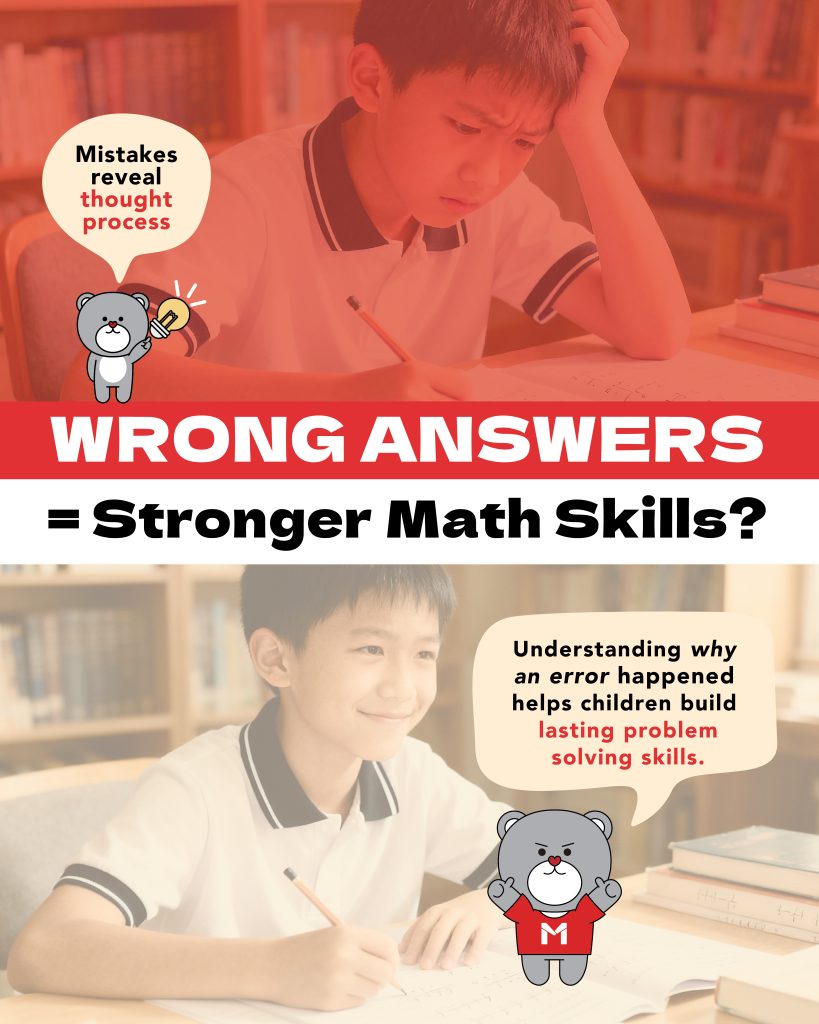
Celebrate Mistakes: How Parents Can Turn Math Slip-Ups into Success
Every parent knows the moment — your child gets a math question wrong, their face falls, and you’re not sure what to say. Should you correct them right away? Should you encourage them? Or maybe just move on?
Here’s the truth: mistakes aren’t failures — they’re stepping stones. Research in learning science shows that when children make and correct mistakes, their brains build stronger connections.
At MathConcept, we see this every day — every error is an opportunity to grow. And with the right words, parents can help children see mistakes as something to celebrate.
Why Mistakes Matter — and What the Brain Says About It
When a child makes a mistake, the brain actually gets a workout. Neuroscientists call it “growing connections” — every time kids correct an error, their brains strengthen.
Think about it: a child learns far more from fixing a subtraction slip than from getting the answer right on the first try. Wrong answers are not the end of the road — they’re the start of deeper understanding.
And this is true no matter where your child is — whether it’s a Grade 3 student in Vancouver practicing multiplication or a Grade 7 student in Toronto tackling algebra. Across Canada, more schools and families are recognising that math success is built on understanding, not memorisation.
How Parents Can Reframe Mistakes at Home
The words we use matter. A small shift in language can turn frustration into motivation.
- Instead of: “That’s wrong.”
- Try: “Great — now we know what to practice!”
One phrase shuts the door. The other opens it wide.
When parents respond with calm encouragement, children start to see mistakes not as scary, but as normal — even helpful. That’s how math anxiety begins to melt away.
Celebrate the Process, Not Just the Answer
At MathConcept, our tutors are trained to notice the process — not just the answer. They model the same approach we encourage parents to use at home: praise effort, reasoning, and persistence.
When your child tries a new strategy, say: “I like how you thought about it differently.” Or, “You worked hard on that step.”
Athletes, musicians, even scientists all stumble before they succeed. Why should math be any different? Each corrected mistake is a small win — and those small wins build lasting confidence.
What Tutors at MathConcept Do
Our tutors don’t stop at the wrong answer. Instead, they ask questions like: “Why do you think that?” or “Can you show me your steps?”
Sometimes the mistake is just a skipped detail. Other times, it reveals a gap in understanding. Either way, wrong answers become teaching moments — not dead ends.
This approach teaches persistence and problem-solving. Kids learn that math isn’t about being perfect — it’s about thinking, trying, and improving.
Tips Parents Can Use Right Away
Want to try this at home? Here are a few quick ways to celebrate mistakes:
✅ Say: “Let’s figure out what part was tricky.”
✅ Share your own math slip-ups to normalise mistakes.
✅ Keep a “Mistake Journal” — kids write down an error, then how they fixed it.
✅ Celebrate corrected mistakes with a high-five or sticker.
✅ Remind them: every mistake is proof they’re learning something new.
A Final Word for Parents
Every child deserves to know that a mistake isn’t the end — it’s the beginning.
With your encouragement, mistakes can become the very moments that build resilience, confidence, and a love for learning.
At MathConcept, we celebrate mistakes every day, because that’s where our students’ real learning stories begin. When children are encouraged to explore their errors, they discover new ways of thinking and grow into confident, resilient problem-solvers. And for us as educators, every mistake they make is a reminder of what teaching is truly about — guiding curiosity, not just correcting answers.
Want to see how this looks in action? Book a free math assessment with us today — and discover how we turn mistakes into confidence, one problem at a time.
Stay Connected
At MathConcept, we believe learning doesn’t stop at the classroom — and neither does inspiration. 💡 We regularly share parent tips, learning insights, and confidence-building ideas on our social media to help families nurture growth every day.
📘 Follow us on Facebook and Instagram to discover more ways to support your child’s learning journey.


